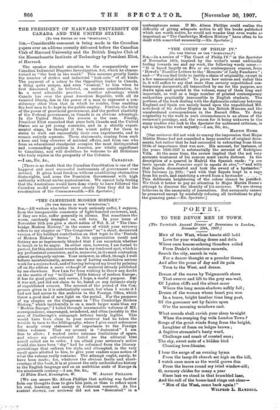"THE CAMBRIDGE MODERN HISTORY."
ITO THU EDITOR Or TRH SPROTATOR:1
writers who take their work seriously suffer, I suppose, from the irresponsible comments of light-hearted reviewers, and, if they are wise, suffer generally in silence. But sometimes the worm, carelessly trampled on, will turn. In your issue of November 16th you give a short notice of Vol. X. of " The Cam- bridge Modern History," in the course of which your reviewer refers to my chapter on "The Congresses " as " a short, desiccated version of his brilliant contribution on that topic to the 'Periods of Modern History' Series." In this appreciation insult and flattery aro so ingenuously blended that I am uncertain whether to laugh or to bo angry. In either case, however, I am forced to protest, for this statement wounds me in my tenderest spot, which is my professional conscience, and is, moreover, in its main contention almost grotesquely untrue. Your reviewer, in effect, though I well believe unintentionally, accuses me of having undertaken serious work for a serious book, and of having betrayed my trust by palming off on the editors a mere rediauffe of material already published by me elsewhere. Now I am far from wishing to throw any doubt on the merits of my "brilliant" little history of modern Europe; it has its good points, and serves, I hope, a useful purpose. But it was not, and did not claim to be, based on auy intimate study of unpublished sources. The account of the period of the Con- gresses given in it is substantially correct, but when I wrote it I had not had access to the archives in the Foreign Office, which throw a good deal of new light on the period. For the purposes of my chapter on the Congresses in "The Cambridge Modern History," which incidentally is on a much larger scale than my " Modern Europe," I toiled through innumerable volumes of MS. correspondence, unarranged, unindexed, and often (notably in the case of Castlereagh's autograph letters) barely legible. This would have been clear to your reviewer had he taken the trouble to turn to the bibliography, where I give exact references for nearly every statement of importance to the Foreign Office volumes. That my account is " desiccated" I am free to allow ; I worked under extreme limitations of space, and where my self-restraint failed me the editorial blue pencil called me to order. I am afraid your reviewer's notice would also have been "dry" had he refrained from the literary garnishings that enliven his style, and attempted, in the very small space allotted to him, to give your readers some notion of what the volume really contains. The attempt ought, surely, to have been made ; for, whatever the obvious faults and short- comings of the hook, it is at present the only authoritative history in the English language and on an ambitious scale of Europe in the nineteenth century.—I am, Sir, die., [We can assure Kr. Alison Phillips that nothing was further from our thoughts than to give him pain, or than to reflect upon his zeal, learning, and energy in historical research. As the context showed, our reviewer did not use "desiccated" in a contemptuous sense. If Mr. Alison Phillips could realise the difficulty of giving adequate notice to all the books published which are worth notice, he would not wonder that even works so important as "The Cambridge Modern History" have often to be dealt with somewhat summarily.—En. Spectator.]


















































 Previous page
Previous page